Postnatal Outcomes of Intrauterine Transfusion Infants Due to Immun-Hemolytic Disease
Abstract
Immune-hemolytic disease of fetus and newborn is the clinical picture where maternal specific IgG autoantibodies passing through placenta bind to erythrocytes and result in progressive fetal hemolysis. This hemolysis can lead to fetal anemia. In severe cases, can cause hydrops fetalis and intrauterine death. The use of Rh immune globulin to prevent susceptibility of Rhesus (Rh) negative pregnant women has reduced the immune-hemolytic disease of the fetus to 1 / 300-1 / 600 live births (1). Despite advances in the use of Rhesus immunoglobulin prophylaxis, perinatal mortality remains approximately 1% in high resource countries and as high as 14% in low resource countries (2,3). These outcomes are preventable with fetal blood sampling and intrauterine transfusion (IUT), which have greatly im- proved survival in affected pregnancies, including those with fetal hydrops, and those with an onset < 22 weeks’ gestational age. The aim of this study was to evaluate the postnatal outcomes of newborns who received transfusion in the intrauterine period due to immun-hemolytic disease.
Method:
This study was performed retrospectively between March 2018 and July 2019. Infants who underwent erythrocyte transfusion during the intrauterine period with the diagnosis of immune-hemolytic disease and followed in the neonatal intensive care unit were included. Demographic data of the patients, APGAR scores at 1 and 5 minutes, prenatal erythrocyte transfusion, exchange transfusion and postnatal erythrocyte transfusion requirement, birth hemoglobin and bilirubin levels and reticulocyte count, highest bilirubin level, intrauterine transfusion number, duration of phototherapy, hydrops status, discharge status duration and mortality rate were recorded. Data analysis and report writing operations were performed on computer. Median (min-max), frequency distributions and percentages were used to summarize the data. Mann-Whitney U test was used for comparisons between the groups and p <0.05 was accepted for statistical significance.
Results:
A total of 16 infants were included in the study. The median gestational week was 34 (28-37) and the median birth weight was 2395 (1420-2985) grams. Nine (56.25%) of the babies were female and 7 (43.75%) were male. All were born by cesarean section. The median Apgar 1st and 5th minute scores were 5 (0-6) and 6 (3-10), respectively.
The median hemoglobin median was 8 (4-18), reticulocyte count 8.5 (0-52), the highest bilurubin level median was 10 (4-20) and median phototherapy time was 4.5 (1-6) days. Ten patients had 3 or less intrauterine transfusions and 6 patients had more than 3 intrauterine transfusions. Exchange transfusion was performed a maximum of 2 times in 10 (62.5%) infants. Postnatal erythrocyte transfusion was performed to 6 (37.5%) infants due to anemia during the period until discharge. 10 (62.5%) of the infants had hydrops findings. The median discharge time was 19 (1-78) days. A total of 2 infants (12.5%) died (Table-1).
Keywords
References
- References 1- Hendrickson JE, Delaney M. Hemolytic disease of the fetus and newborn: modern practice and future investigations. Transfus Med Rev. 2016;Oct;30(4):159-64. 2- Urbaniak SJ, Greiss MA. RhD haemolytic disease of the fetus and the newborn. Blood Rev.2000 Mar; 14(1): 44–61. 3- Zipursky A, Paul VK. The global burden of Rh disease. Arch Dis Child Fetal Neonatal Ed. 2011 Mar; 96(2):F84–5. 4- Choavartana R, Uer-Areewong S, Makanantakosol S. Fetomaternal transfusion in normal pregnancy and during delivery. J Med Assoc Thai 1997;80(2):96–100. 5- Lobo GA, Nardozza LMM, Camano L. Non-anti-D antibodies in red cell alloimmunization. Int J Gynecol Obstet 2006;94:139–40. 6- Çetinkaya M, Özkan H, Köksal N, Akkuş H, Kimya Y. Rh Hemolitik Hastalığında i intrauterin Transfüzyonun Neonatal Sonuçlara Etkisi. Güncel Pediatri 2010; 8: 1-6 7- Gobalakichenane P, Lardennois C, Gale`ne-Gromez S, Brossard V, Marpeau L, Verspyck E et al. Perinatal management and neurological outcome of infants with Rhesus hemolytic disease. Gynecol Obstet & Fertil 2008;36:984-90. 8- Şavkli AÖ, Çetin BA, Acar Z, Özköse Z, Behram M, Çaypinar SS, Tayyar A, Yüksel MA. Perinatal outcomes of intrauterine transfusion for foetal anaemia due to red blood cell alloimmunisation. J Obstet Gynaecol. 2019 Aug 29:1-5. 9- Potdar O, Narkhede HR, Satoskar PR. Perinatal Outcome After Intrauterine Transfusion in Rh Isoimmunized Mothers. J Obstet Gynaecol India. 2019 Apr;69(2):123-128.
Abstract
References
- References 1- Hendrickson JE, Delaney M. Hemolytic disease of the fetus and newborn: modern practice and future investigations. Transfus Med Rev. 2016;Oct;30(4):159-64. 2- Urbaniak SJ, Greiss MA. RhD haemolytic disease of the fetus and the newborn. Blood Rev.2000 Mar; 14(1): 44–61. 3- Zipursky A, Paul VK. The global burden of Rh disease. Arch Dis Child Fetal Neonatal Ed. 2011 Mar; 96(2):F84–5. 4- Choavartana R, Uer-Areewong S, Makanantakosol S. Fetomaternal transfusion in normal pregnancy and during delivery. J Med Assoc Thai 1997;80(2):96–100. 5- Lobo GA, Nardozza LMM, Camano L. Non-anti-D antibodies in red cell alloimmunization. Int J Gynecol Obstet 2006;94:139–40. 6- Çetinkaya M, Özkan H, Köksal N, Akkuş H, Kimya Y. Rh Hemolitik Hastalığında i intrauterin Transfüzyonun Neonatal Sonuçlara Etkisi. Güncel Pediatri 2010; 8: 1-6 7- Gobalakichenane P, Lardennois C, Gale`ne-Gromez S, Brossard V, Marpeau L, Verspyck E et al. Perinatal management and neurological outcome of infants with Rhesus hemolytic disease. Gynecol Obstet & Fertil 2008;36:984-90. 8- Şavkli AÖ, Çetin BA, Acar Z, Özköse Z, Behram M, Çaypinar SS, Tayyar A, Yüksel MA. Perinatal outcomes of intrauterine transfusion for foetal anaemia due to red blood cell alloimmunisation. J Obstet Gynaecol. 2019 Aug 29:1-5. 9- Potdar O, Narkhede HR, Satoskar PR. Perinatal Outcome After Intrauterine Transfusion in Rh Isoimmunized Mothers. J Obstet Gynaecol India. 2019 Apr;69(2):123-128.
Details
| Primary Language | English |
|---|---|
| Subjects | Health Care Administration |
| Journal Section | Congress Proceedings |
| Authors | |
| Publication Date | December 10, 2019 |
| Acceptance Date | January 16, 2020 |
| Published in Issue | Year 2019 Volume: 7 Issue: Ek - IRUPEC 2019 Kongresi Tam Metin Bildirileri |

